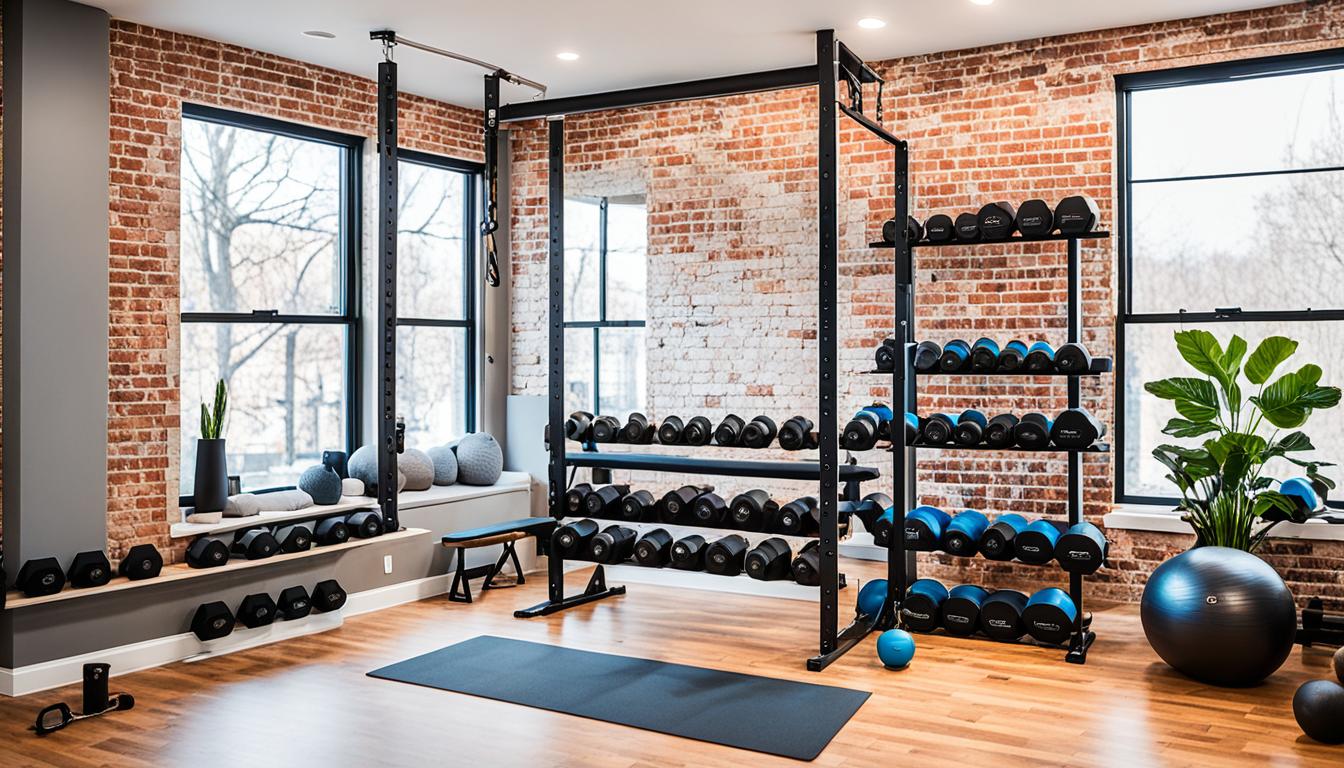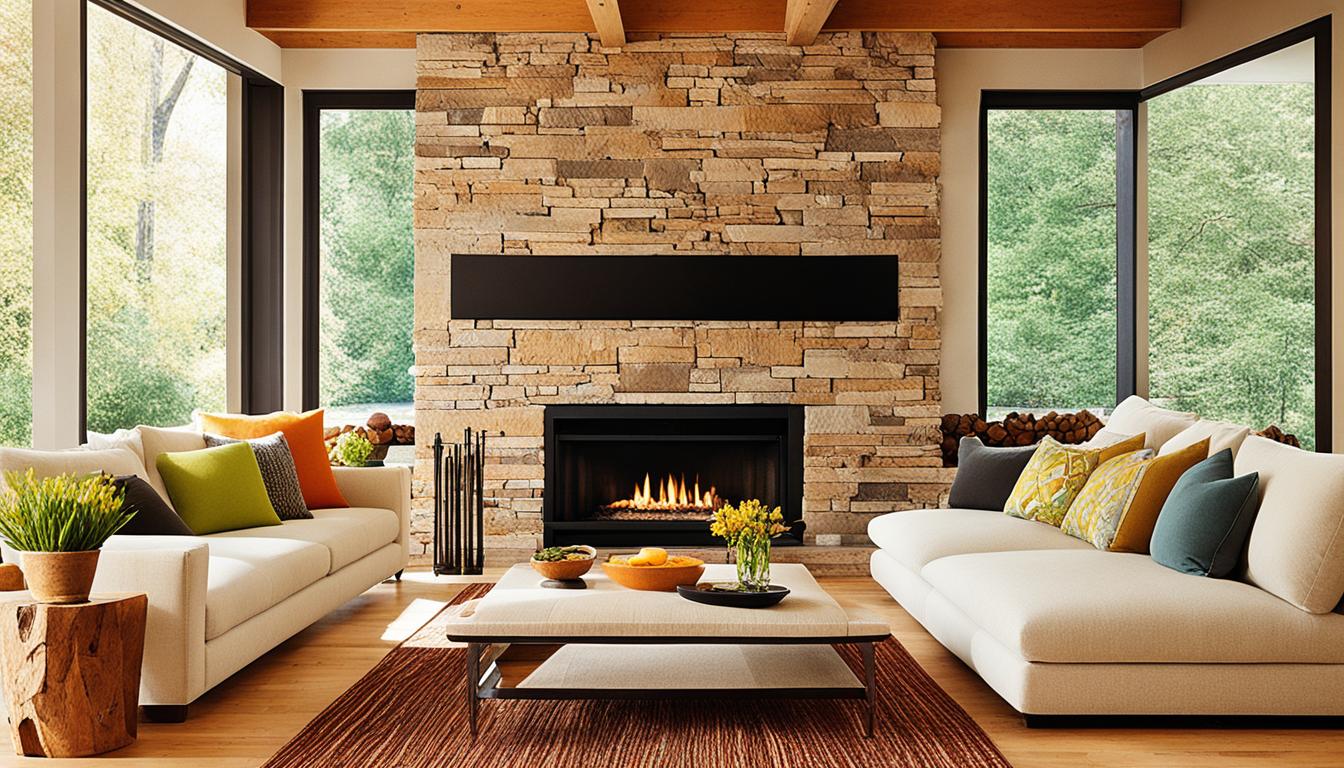Sarah used to think workout routines were dull. However, the pandemic introduced her to a different approach: exercising at home. She converted a neglected corner of her living room into a personal gym. Using simple equipment and a limited budget, she scouted for discounts on fitness gear.
Sarah’s gym started with just a yoga mat and dumbbells. It grew to include resistance bands, a jump rope, and even plants for cheer. This move saved her money on gym fees. Plus, it made her love fitness, fitting her schedule and likes.
In this guide, you’ll get tips to make a home gym that meets your fitness dreams without costing a lot. No matter your budget or the room you have, setting up a home workout area is possible.
Key Takeaways
- Setting up a home gym can be done on any budget, catering to a wide range of fitness enthusiasts.
- Affordability is essential, utilizing simple storage solutions like metal shelving for gym equipment organization.
- Safety measures are vital for home gym setups, ensuring equipment stability and designed layouts for movement.
- Personalizing your fitness space with décor can enhance motivation and create an inspiring environment.
- Small, effective home exercise equipment can significantly impact workout routines without heavy financial investment.
- Proper planning of your workout space contributes to a more functional and stimulating exercise environment.
Benefits of Having a Home Gym
Building a home gym offers many benefits that change how you work out. It lets you make a fitness space that suits your schedule and needs. This flexibility isn’t found in public gyms.
One key benefit is convenience. There’s no need to travel, which saves time and lets you work out any time. People are more likely to exercise when it’s easy and fits their lifestyle. This has led to more people working out at home.
The cost is another major factor. Starting a home gym requires some money upfront. But, you’ll save on gym fees and travel costs over time. This means saving money while staying committed to staying fit. Plus, you can pick workouts that you enjoy the most.
Home gyms also offer a wide range of exercises. You can use dumbbells and kettlebells to work different muscle groups. Bodyweight exercises and resistance bands are great too. They offer varied workouts without needing a lot of equipment.
Starting with basic tools like stability balls can also target key areas. Slowly adding different equipment keeps workouts interesting and motivation high. This way, your fitness journey remains fun and effective.
In conclusion, the convenience and savings of home gyms attract many people. With the right setup, anyone can start their fitness journey at home. It’s a great way to stay fit and save money.

UNNMIIY Adjustable Dumbbells, 20/30/45/70/90lbs Free Weight Set with Connector,5 in1 Dumbbells Set Used as Barbell, Kettlebells, Push up Stand, Fitness Exercises for Home Gym Suitable Men/Women
5 in 1 Multifunctional Dumbbell Set:With UNNMIIY adjustable dumbbell set, you can get a pair of dumbbells also…
As an affiliate, we earn on qualifying purchases.
As an affiliate, we earn on qualifying purchases.
Essential Equipment for Your Home Gym
Building a home gym means choosing essential equipment wisely. People have different fitness goals, but some items are key for everyone. These items include weights for lifting and machines for cardio. Picking the right tools will make your fitness journey more effective.
Weights and Resistance Training
For a home gym, weights for home gym setups are essential. Adjustable dumbbells and kettlebells are great since they let you switch up the resistance. They are compact and versatile, making them a smart first buy. Resistance bands add variety to workouts. Loop and tube bands, especially with door mounts, are good choices.
Cardio Options
There are many cardio workout options to keep your heart healthy. Treadmills, spinning bikes, and rowing machines are top picks for endurance. Jump ropes are good for tight spaces and offer a solid cardio workout. It’s wise to get at least one good cardio machine to improve fitness.
Stretching and Recovery Tools
Recovery tools are a must-have in any fitness plan. Foam rollers and Theraguns help your muscles recover and improve flexibility. They reduce soreness and help with better movement after exercising. Adding these to your home gym makes your workout plan complete.
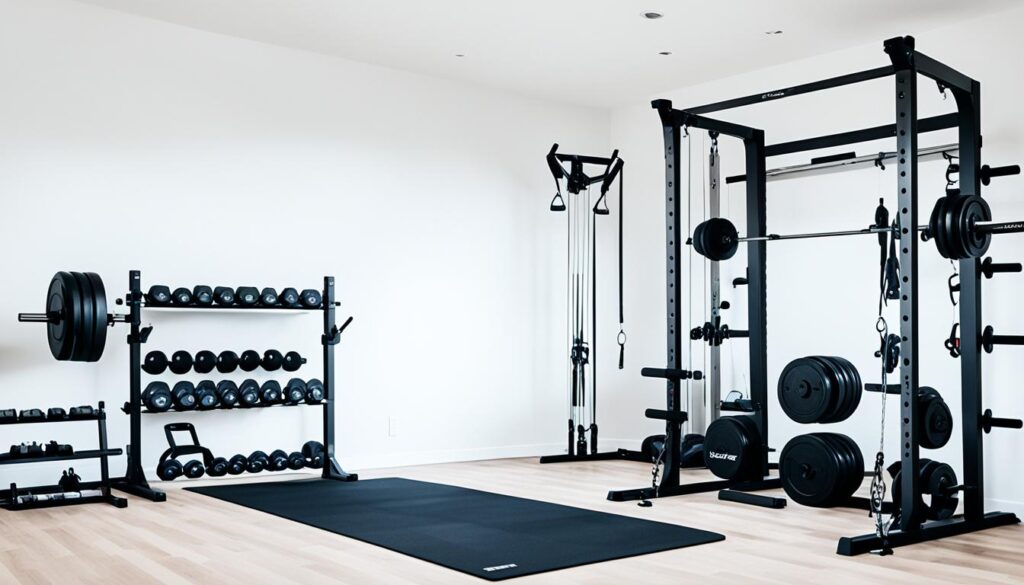

Pull Up Bands, Resistance Bands, Pull Up Assistance Bands Set for Men & Women, Exercise Workout Bands for Working Out, Body Stretching, Physical Therapy, Muscle Training – Colorful
100% Natural Latex
As an affiliate, we earn on qualifying purchases.
As an affiliate, we earn on qualifying purchases.
Budgeting for Your Home Gym Setup
Creating a budget for your home gym is an important first step. It determines how much you can spend without stress. A budget helps you focus your money on what you need based on your fitness goals and the costs of fitness equipment.
Determining Your Budget
Start by looking at your finances to set a spending limit. Costs range widely. Simple gear like resistance bands or yoga mats start at $20. But, full setups can go over $2000. Here’s a quick overview:
| Budget Category | Estimated Cost | Equipment Included |
|---|---|---|
| Low-Cost | Under $100 | Bodyweight exercises, resistance bands |
| Mid-Range | $200-$500 | Adjustable dumbbells, kettlebells, yoga gear |
| High-End | Over $1000 | Power racks, cardio machines (e.g., Peloton) |
Prioritizing Equipment Purchases
Once you have a budget, picking the right equipment is key. Start with basic items that offer a lot of value. Adjustable dumbbells, like those from NordicTrack or Bowflex, are a great choice. They’re versatile and offer a range of weights.
Also, consider the Fitness Reality 810XLT Super Max Power Cage for a good deal. Beginning with essential gear lets you manage your budget and still get a great workout.
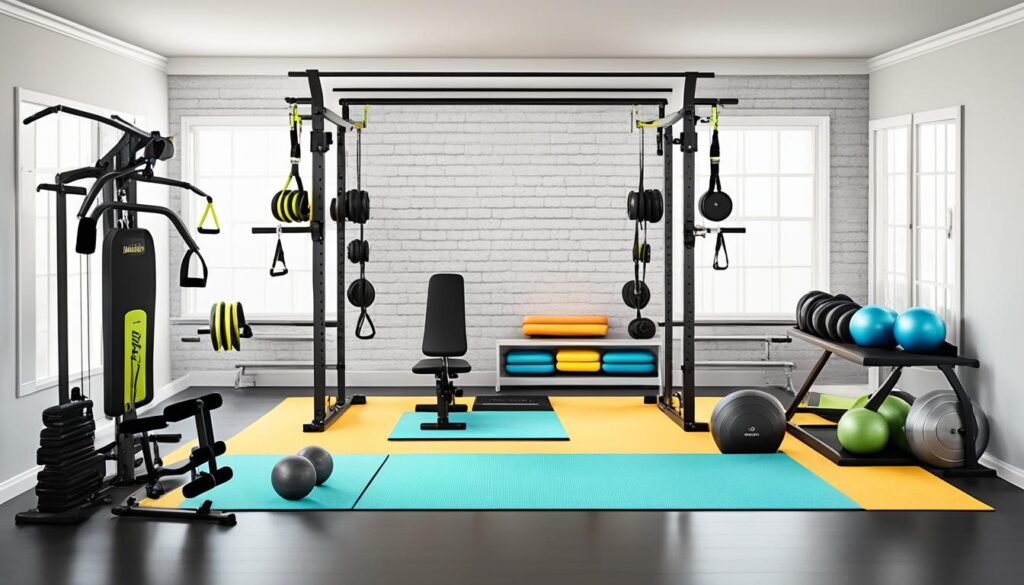

Amazon Basics 1/2 Inch Extra Thick Exercise Yoga Mat with Carrying Strap for Home Workouts and Fitness, 74" x 24", Black
Extra thick, cushy floor mat in Black for yoga, gym, and everyday exercise
As an affiliate, we earn on qualifying purchases.
As an affiliate, we earn on qualifying purchases.
Fitness at Home: Setting Up the Perfect Home Gym on Any Budget
Creating your own gym space at home is rewarding. It’s perfect for those with limited space. With careful planning, one can set up effective workout areas that fit their lifestyle. A workout space in a room, basement, or corner can inspire your exercise routine. Picking the right equipment carefully helps you make the most of your workouts. This way, you won’t have to sacrifice space or accessibility.
Creating a Dedicated Workout Space
Having a special spot for fitness makes exercising a daily habit. Even small corners can become workout areas. Consider how Trisha Enriquez turned a small basement into a gym. Beginning with basic gear allows for slow additions, making fitness fun and simple. Setting up a workout space means you’ve always got a reason to exercise.
Choosing Space-Saving Equipment
Choosing the right tools for your home gym is key. Options that save space but are effective include:
- Adjustable dumbbells
- Kettlebells for versatile workouts
- Resistance bands for strength
- Jump ropes for heart health
These items let you exercise your whole body without cluttering the room. Adding a foldable bench or a compact pull-up bar can make your gym even better. These choices support many kinds of workouts and can grow with your fitness journey.
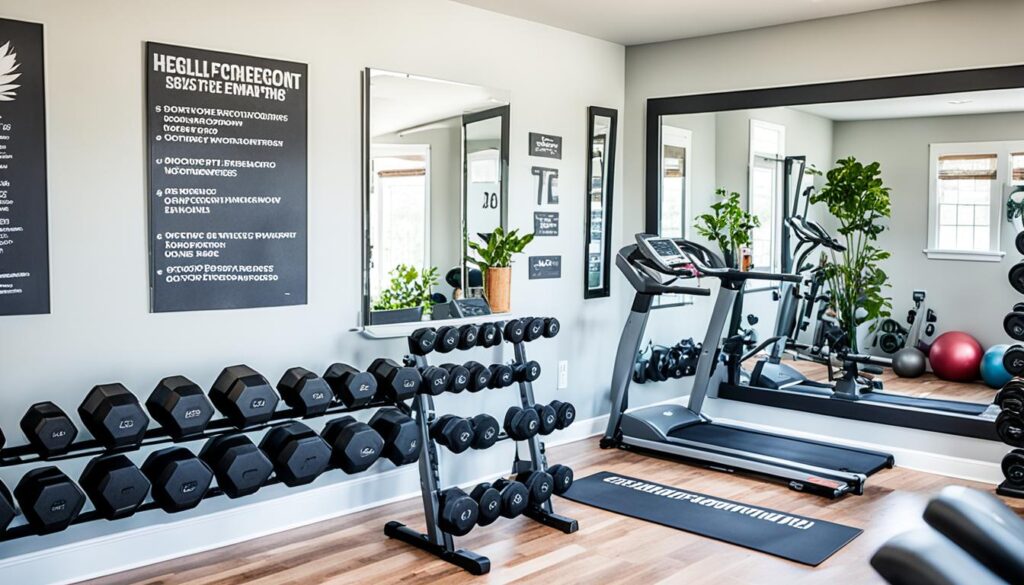
Starting a home gym is easy with the right approach. By picking versatile tools and using your space wisely, you can build a welcoming workout spot. Simple, adaptable equipment helps transform a small area into an inspiring place for health and fitness.

XGSW Multi-Function Home Gym Workout Station, Featuring a Pulley System, arm Trainer, and Leg Trainer for Full-Body Workouts. (L03-1 Single-Person Fitness Station)
L03-1 Fitness Rack is specifically designed for home gyms, helping you create a versatile workout space at home….
As an affiliate, we earn on qualifying purchases.
As an affiliate, we earn on qualifying purchases.
Buying Equipment Without Breaking the Bank
Setting up a home gym shouldn’t empty your wallet. Making wise choices helps get quality gear while saving money. Focus on fitness tools that do more than one thing. This way, you save both space and cash. For example, adjustable dumbbells replace multiple weights with one item, being both space-friendly and cost-effective.
Investing in Multi-Tasking Tools
Multifunctional fitness tools make workouts better without costing too much. The Titan Fitness T-2 Series Rack, for around $400, supports up to 2,200 lbs. It’s a strong base for any home gym. Add Iron Bull Strength Powder-Coated Kettlebells to your kit, ranging from 4 to 70 lbs. They’re tough, color-coded for quick selection, and built to last.
Buying Secondhand Gym Equipment
Looking for secondhand workout gear can save a lot of money. Sites like Facebook Marketplace have lightly used items at low prices. Always check the items well. A good find could be the Giant Lifting Adjustable Weight Bench. It’s light and adjusts to six positions, adding great value for less money.
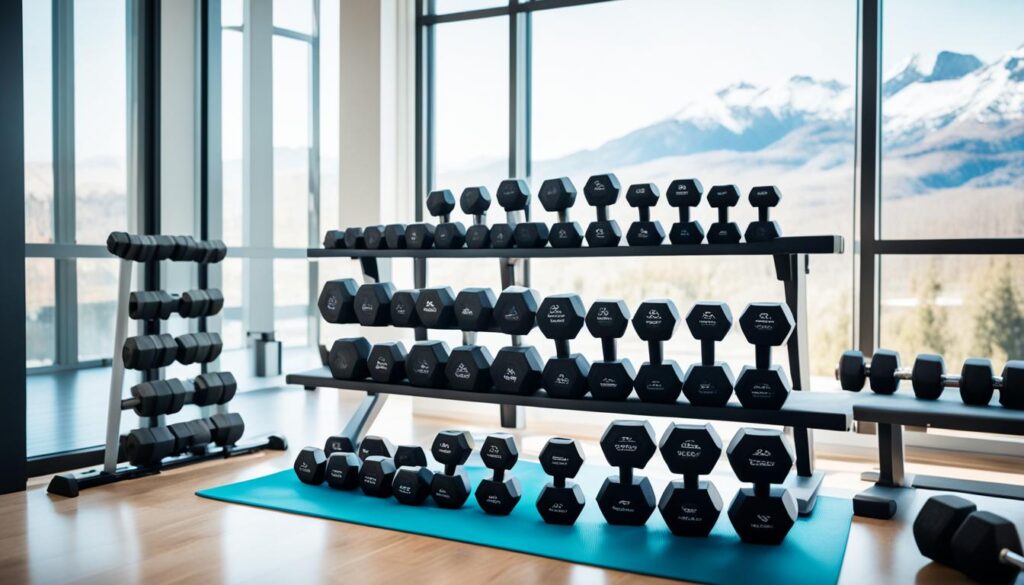
Invest smart to keep quality high without spending a lot. Bells of Steel offers durable products at lower prices when you buy more together. For a full setup, consider their residential power rack at $449. Pair it with Bells of Steel interlocking rubber flooring mats at $35 each. This combination makes your gym safe and stays within budget.
| Item | Price | Weight Capacity | Special Features |
|---|---|---|---|
| Titan Fitness T-2 Series Rack | $400 | 2,200 lbs | Stability and strength |
| Iron Bull Strength Kettlebells | Varies | Up to 70 lbs | Durable cast iron, color-coded |
| Giant Lifting Adjustable Weight Bench | Budget-friendly | Not specified | 6 back adjustments, stable design |
| Bells of Steel Residential Power Rack | $449 | High | Discounts available with bundles |
| Bells of Steel Interlocking Puzzle Rubber Mat | $35 per piece | Durable | Creates safe workout environment |
Setting Up Your Workout Routine
Creating a workout routine at home is crucial. It’s important to pick workout routines at home that fit your space and are fun. Luckily, many fitness apps and online resources can help.
Finding Workouts That Fit Your Space
First, look at how much space you have. For small areas, bodyweight exercises or minimal equipment work well. HIIT routines are great because they don’t need much gear.
Exercises like push-ups and squats are good. Customizing your routine for your space helps keep you on track. Apps like Peloton and Les Mills On Demand have classes for all kinds of spaces and skill levels.
Utilizing Apps and Online Resources
Fitness apps are super helpful for setting up your workout plan. Peloton, Nike Training Club, and MyFitnessPal let you pick from many classes, track your progress, and join fitness communities. They offer:
- Many workout choices for any spot
- Videos to help with your technique
- Plans made just for you
Don’t forget about online resources like blogs and YouTube channels. They have lots of tips and advice for workout routines at home. They keep you interested and motivated.
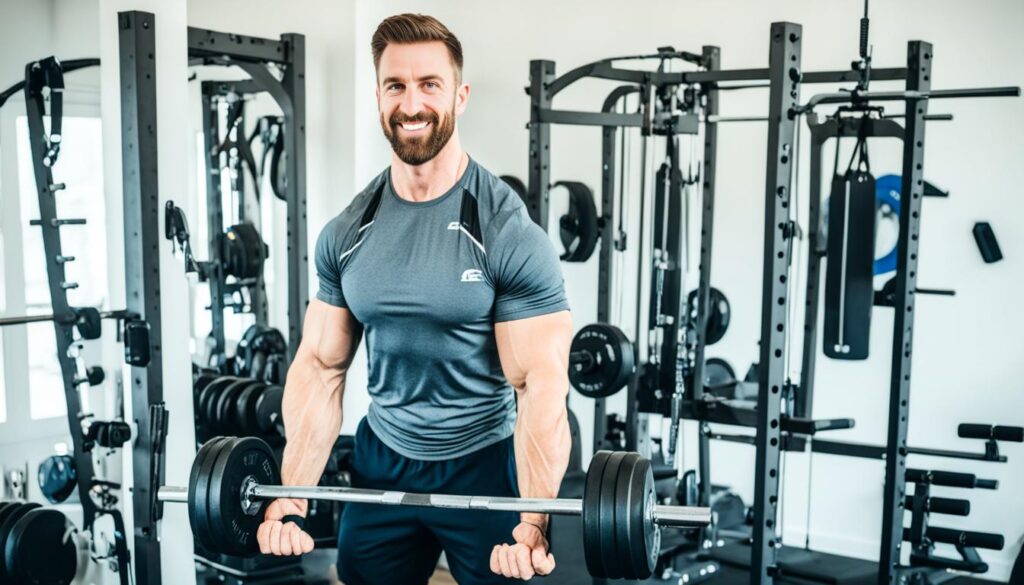
| Fitness App | Key Features | Average Monthly Cost |
|---|---|---|
| Peloton | Live and on-demand classes, community features, various workout types | $12.99 |
| Nike Training Club | Bodyweight and equipment-based workouts, customizable plans | Free & Pro version $14.99 |
| MyFitnessPal | Calorie tracking, meal planning, supports workout log | Free & Premium version $19.99 |
Having the right tools and a custom plan can make your home workouts powerful and fun.
Tips for Creating an Apartment Home Gym
Starting a home gym in your apartment is both exciting and smart. You might face challenges like not having much room and the noise it might make. But, with some clever tips, you can make the most of your space. This makes sure your exercises stay fun and effective. Using these gym ideas in your apartment can make working out easy without giving up your comfort.
Maximizing Your Space
When space is tight, thinking upwards is smart. Think about putting up wall racks for your dumbbells or resistance bands. Folding mats are great because you can put them away, giving you back your floor space. Items like resistance bands or adjustable dumbbells are perfect. They don’t take up much room and are super useful. Check out these small gym tips:
- Incorporate stackable storage bins for smaller items.
- Use furniture, such as benches with built-in storage, to combine utility and style.
- Choose multi-purpose machines that do several exercises in one piece of equipment.
Noise Reduction Solutions
Worrying about bothering your neighbors in an apartment is common. But, there are quiet workout tools out there. Thick mats can help muffle sounds, making your workout quieter. Choosing quieter equipment, like air bikes or bikes with magnetic resistance, helps a lot. You can also try these ideas for keeping things quiet:
- Put down carpets or rugs to help block sound.
- Look for workout gear that’s designed to make less noise.
- Plan your workouts for when you’re less likely to disturb your neighbors.
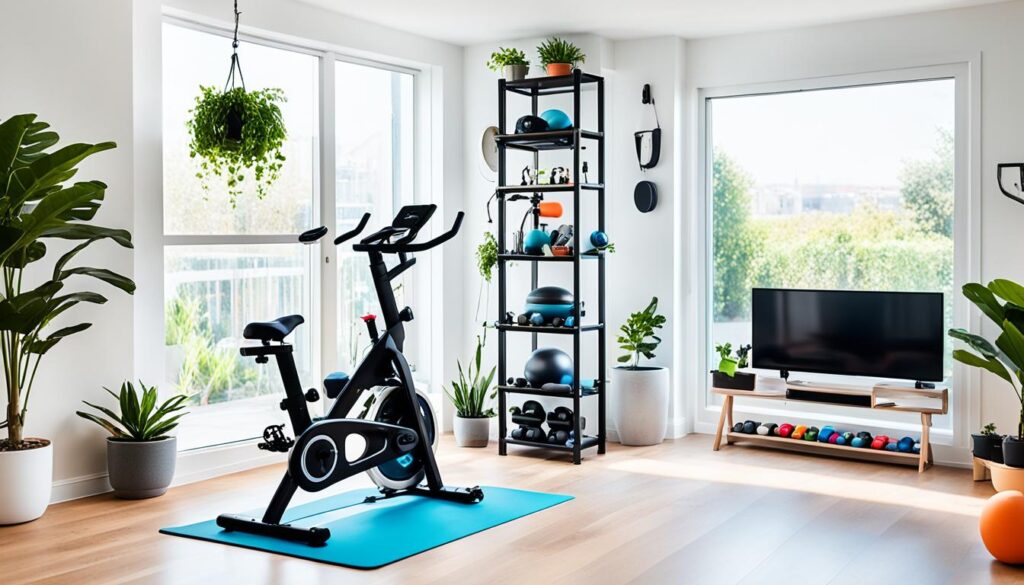
| Equipment Type | Space Requirement | Noise Level |
|---|---|---|
| Adjustable Dumbbells | Minimal | Low |
| Resistance Bands | Minimal | Silent |
| Yoga Mat | Small | Silent |
| Stationary Bike | Moderate | Moderate |
| Treadmill | Moderate | High |
To make a great gym in your apartment, think about the best fitness solutions and saving space. Choosing the right gear and managing noise will make your workouts enjoyable. You can have an amazing workout space in any apartment.
Cost Breakdown of Home Gym Setups
Understanding the costs of setting up a home gym helps you decide wisely. This guide covers different price ranges for setting up a budget-friendly gym. It shows what equipment you can get at each price level.
Home Gym Under $100
You can set up a simple workout area for less than $100. Here’s what you can buy without spending much:
- Resistance bands: $10 – $30
- Jump rope: $10 – $20
- Exercise mat: $20 – $50
- Lightweight kettlebells: $25 – $40
Home Gym Under $500
A budget of $500 brings more options for equipment. It’s great for building a better workout space:
- Dumbbells: $25 – $400
- Kettlebells: $25 – $400
- Adjustable weight bench: $100 – $300
- Medicine ball: $30 – $150
Home Gym Under $1500
With $1500, you can add versatile workout machines. These machines provide a full-body workout:
- Treadmill: $400 – $1,500
- Rowing machine: $600 – $1,200
- Elliptical: $300 – $2,000
- Indoor bike: $300 – $2,500
Investing in a complete home gym has lasting benefits. The cost, around $2,000 on average, can save money compared to gym memberships. The average gym membership costs about $31 to $44 per month. Having your gym at home not only meets fitness goals but also saves money in the long run.
| Budget Tier | Equipment Examples | Estimated Cost |
|---|---|---|
| Under $100 | Resistance bands, Jump rope, Exercise mat | $10 – $50 each |
| Under $500 | Dumbbells, Kettlebells, Adjustable weight bench | $25 – $300 each |
| Under $1500 | Treadmill, Rowing machine, Indoor bike | $300 – $2,500 each |
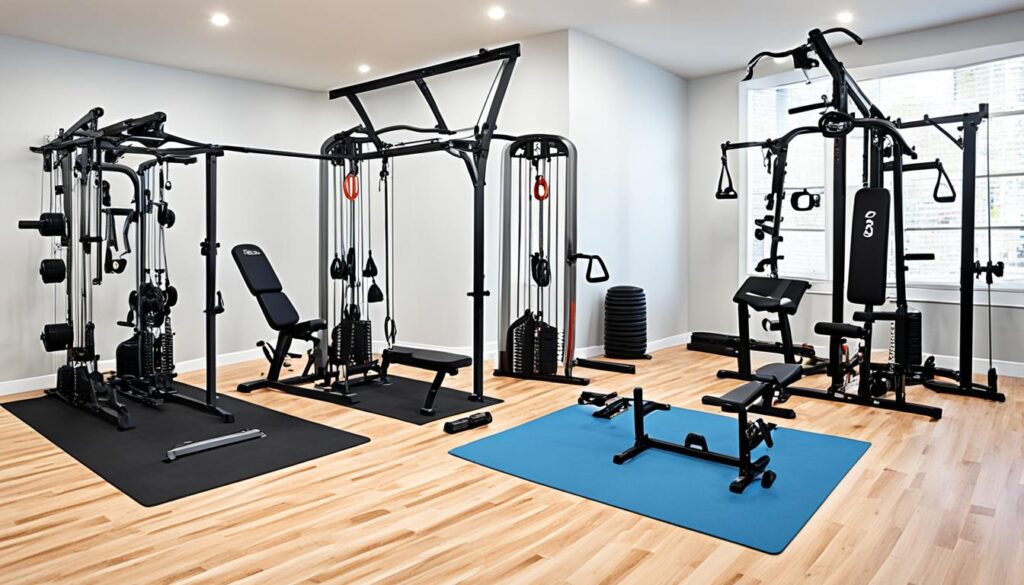
Maintaining Motivation in Your Home Gym
Getting motivated for home workouts can be tough. It’s crucial to set up a workout schedule at home. Doing this converts sporadic fitness attempts into a daily habit.
Establishing a Workout Schedule
Building a structured workout plan boosts steadiness. It matters whether you assign days for varied exercises or work out at the same time daily. A well-thought-out plan is key for steady gym motivation. Tips to keep in mind include:
- Create a weekly plan that includes diverse workouts, such as strength training, cardio, and flexibility sessions.
- Set achievable goals that align with personal fitness aspirations to foster a sense of accomplishment.
- Use reminders or apps to keep track of workout days and times.
Creating an Inspiring Workout Environment
The vibe of your home gym atmosphere matters a lot. A nicely set-up space boosts your mindset. To improve your workout space, consider these suggestions:
- Incorporate good lighting that creates an inviting ambiance.
- Add mirrors to help in monitoring form and technique during workouts.
- Keep the space tidy and organized to minimize distractions and promote a focused mind.
- Include motivational quotes or art to inspire during workouts.
Adding a personal touch can really make your gym spot more inviting. Plus, with a good space and plan, getting fit becomes fun.
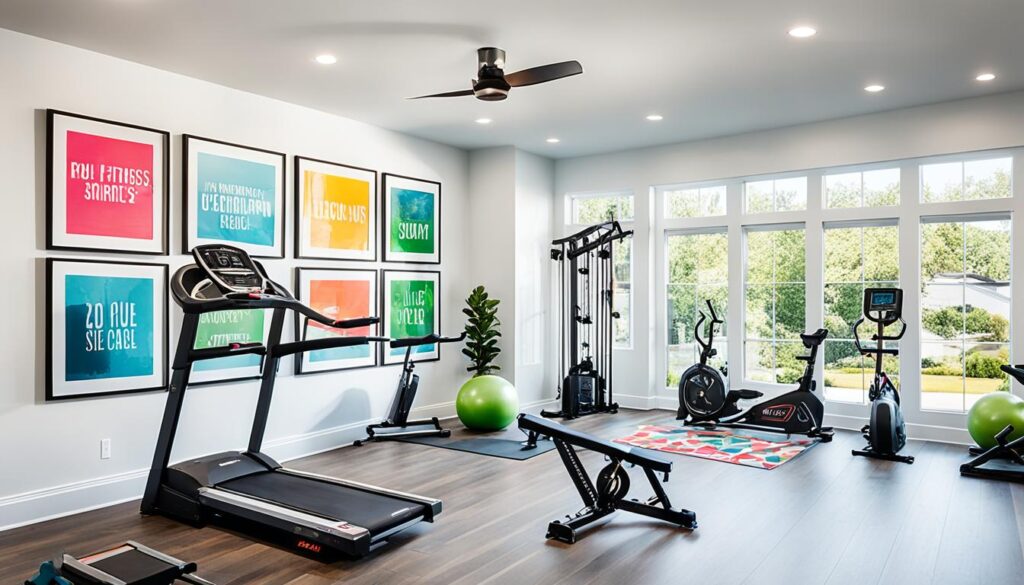
Conclusion
Creating a fitness space at home has many benefits. It improves your health and wellbeing. At home, there’s no pressure like at local gyms, so you can work out in peace. You can make a gym that fits your exact needs and likes, even if you’re on a budget.
Starting small with your home gym is okay. You might begin with basic items like a yoga mat, dumbbells, and some cardio machines. Over time, you can add things to make your workouts better. For organization, consider adding shelves or baskets. This keeps your space tidy and makes exercising more fun.
Reaching your fitness goals doesn’t have to cost a lot. With small steps and a personalized setup, you can enjoy working out at home. Starting this journey means investing in your wellbeing. In the end, this effort pays off and leads to a healthier life.
